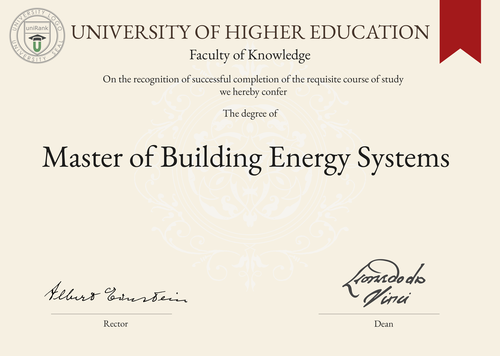
Master of Building Energy Systems (M.B.E.S.)
Guide to Master of Building Energy Systems Program/Course/Degree
Master of Building Energy Systems (M.B.E.S.)

Program Name
Master of Building Energy SystemsProgram or Degree abbreviation
M.B.E.S.Duration range
The duration of the program typically ranges from 1 to 2 years, depending on the university and country.Tuition range
Tuition fees for the Master of Building Energy Systems program can vary significantly depending on the chosen country and university. It is recommended to check with specific institutions for accurate information.Overview
The Master of Building Energy Systems program is designed to provide students with advanced knowledge and skills in the field of energy-efficient building design and management. It focuses on sustainable energy systems, renewable energy technologies, energy conservation and environmental impact assessment.Curriculum Overview by year
The curriculum of the Master of Building Energy Systems program typically covers a wide range of subjects, including: Year 1: - Energy-efficient building design principles - Building energy modeling and simulation - Renewable energy technologies - Energy management and auditing - Sustainable construction materials Year 2: - Advanced topics in building energy systems - Energy policy and regulations - Indoor air quality and ventilation systems - Energy-efficient HVAC systems - Research project or thesisKey Components
Key components of the Master of Building Energy Systems program include: - Understanding energy-efficient building design principles - Proficiency in building energy modeling and simulation software - Knowledge of renewable energy technologies and their integration into buildings - Skills in energy management and auditing - Familiarity with sustainable construction materials and techniquesCareer Prospects
Graduates of the Master of Building Energy Systems program can pursue various career paths, including: - Energy consultant - Sustainable building designer - Energy manager - Environmental consultant - Researcher in energy efficiency and renewable energySalary Expectations
Salary expectations for professionals with a Master of Building Energy Systems degree can vary depending on factors such as location, years of experience and job position. On average, graduates can expect competitive salaries in the field. For a more accurate understanding of salary expectations, you can utilize the Job Sites Search Engine, from our sister site jobRank, which searches over 4,600 job sites worldwide. Make sure to specify not only the job title but also the country you are interested in.Conclusions:
It is important to note that the duration, tuition fees, curriculum, key components, career prospects and salary expectations of the Master of Building Energy Systems program can vary depending on the chosen country and university. Prospective students are advised to research and compare different programs to find the best fit for their goals and preferences. Visitors interested in pursuing a Master of Building Energy Systems degree can use the uniRank World Universities Search Engine to find universities offering this specific degree anywhere in the world.World Universities Search Engine
search for Master of Building Energy Systems (M.B.E.S.) and add the Location (country, state etc.) or specific University you are interested in studying at.
Query examples:
- Master of Building Energy Systems (M.B.E.S.) United States
- Master of Building Energy Systems (M.B.E.S.) United Kingdom online
- Master of Building Energy Systems (M.B.E.S.) Australia international students
- Master of Building Energy Systems (M.B.E.S.) University of California
- Master of Building Energy Systems (M.B.E.S.) University of London tuition fees
- Master of Building Energy Systems (M.B.E.S.) University of Sydney scholarships
Share Program/Course
Interesting? Share this program/course/degree info with your friends now.